The Cambridge History of China. Vol. 12: Republican China, 1912-1949, Part 1
Подождите немного. Документ загружается.

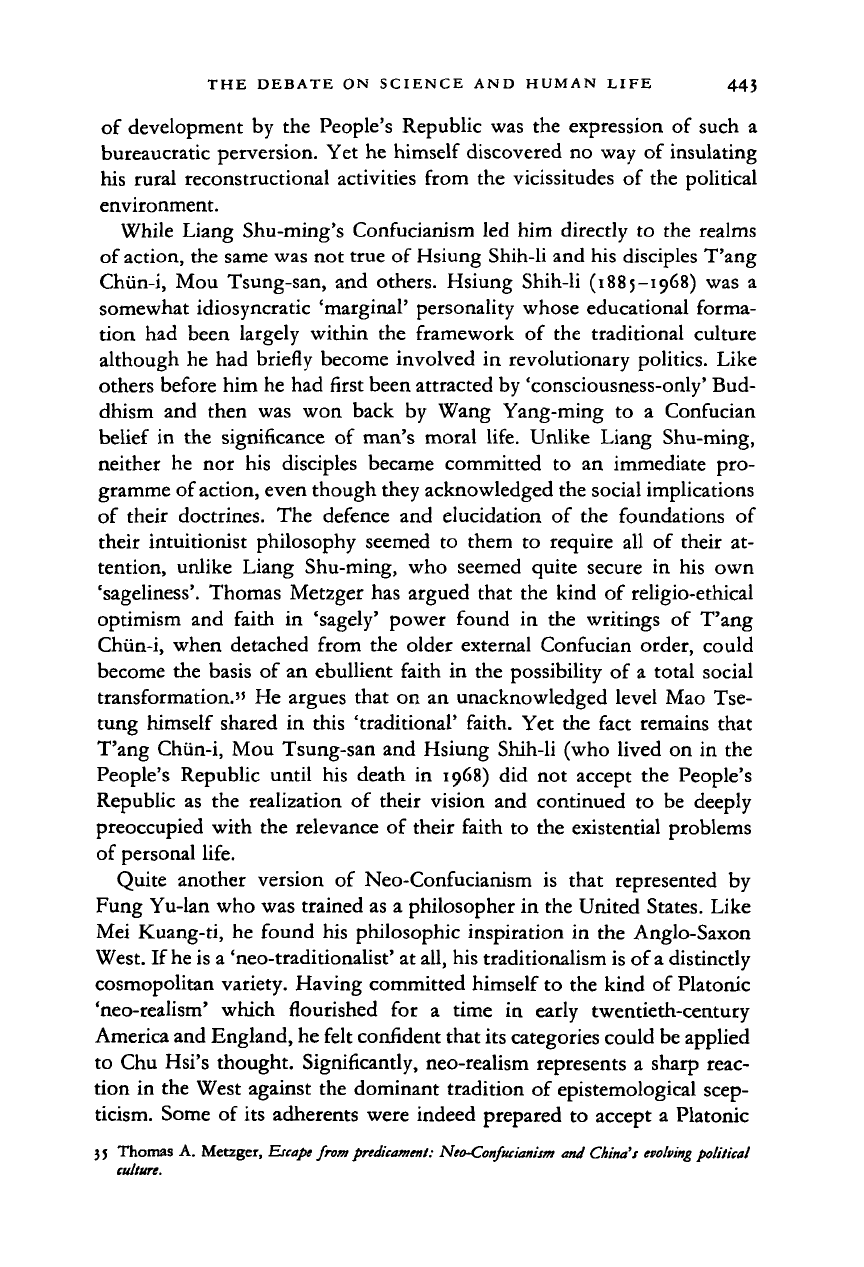
THE DEBATE ON SCIENCE AND HUMAN LIFE 443
of development
by the
People's Republic
was the
expression
of
such
a
bureaucratic perversion.
Yet he
himself discovered
no way of
insulating
his rural reconstructional activities from
the
vicissitudes
of the
political
environment.
While Liang Shu-ming's Confucianism
led him
directly
to the
realms
of action,
the
same was
not
true
of
Hsiung Shih-li and his disciples T'ang
Chiin-i,
Mou
Tsung-san,
and
others. Hsiung Shih-li (1885-1968)
was a
somewhat idiosyncratic 'marginal' personality whose educational forma-
tion
had
been largely within
the
framework
of the
traditional culture
although
he had
briefly become involved
in
revolutionary politics. Like
others before him
he had
first been attracted by 'consciousness-only' Bud-
dhism
and
then
was won
back
by
Wang Yang-ming
to a
Confucian
belief
in the
significance
of
man's moral life. Unlike Liang Shu-ming,
neither
he nor his
disciples became committed
to an
immediate
pro-
gramme of
action,
even though they acknowledged the social implications
of their doctrines.
The
defence
and
elucidation
of the
foundations
of
their intuitionist philosophy seemed
to
them
to
require
all of
their
at-
tention, unlike Liang Shu-ming,
who
seemed quite secure
in his own
'sageliness'. Thomas Metzger
has
argued that
the
kind
of
religio-ethical
optimism
and
faith
in
'sagely' power found
in the
writings
of
T'ang
Chiin-i, when detached from
the
older external Confucian order, could
become
the
basis
of an
ebullient faith
in the
possibility
of a
total social
transformation."
He
argues that
on an
unacknowledged level
Mao Tse-
tung himself shared
in
this 'traditional' faith.
Yet the
fact remains that
T'ang Chiin-i,
Mou
Tsung-san
and
Hsiung Shih-li
(who
lived
on in the
People's Republic until
his
death
in 1968) did not
accept
the
People's
Republic
as the
realization
of
their vision
and
continued
to be
deeply
preoccupied with
the
relevance
of
their faith
to the
existential problems
of personal life.
Quite another version
of
Neo-Confucianism
is
that represented
by
Fung Yu-lan who was trained as
a
philosopher
in the
United States. Like
Mei Kuang-ti,
he
found
his
philosophic inspiration
in the
Anglo-Saxon
West.
If
he
is
a
'neo-traditionalist'
at
all, his traditionalism is
of
a
distinctly
cosmopolitan variety. Having committed himself
to the
kind
of
Platonic
'neo-realism' which flourished
for a
time
in
early twentieth-century
America and England, he felt confident that its categories could be applied
to
Chu
Hsi's thought. Significantly, neo-realism represents
a
sharp reac-
tion
in the
West against
the
dominant tradition
of
epistemological scep-
ticism. Some
of
its adherents were indeed prepared
to
accept
a
Platonic
)5 Thomas
A.
Metzger,
Escape
from
predicament:
Neo-Confucianism
and
China's evolving
political
culture.
Cambridge Histories Online © Cambridge University Press, 2008
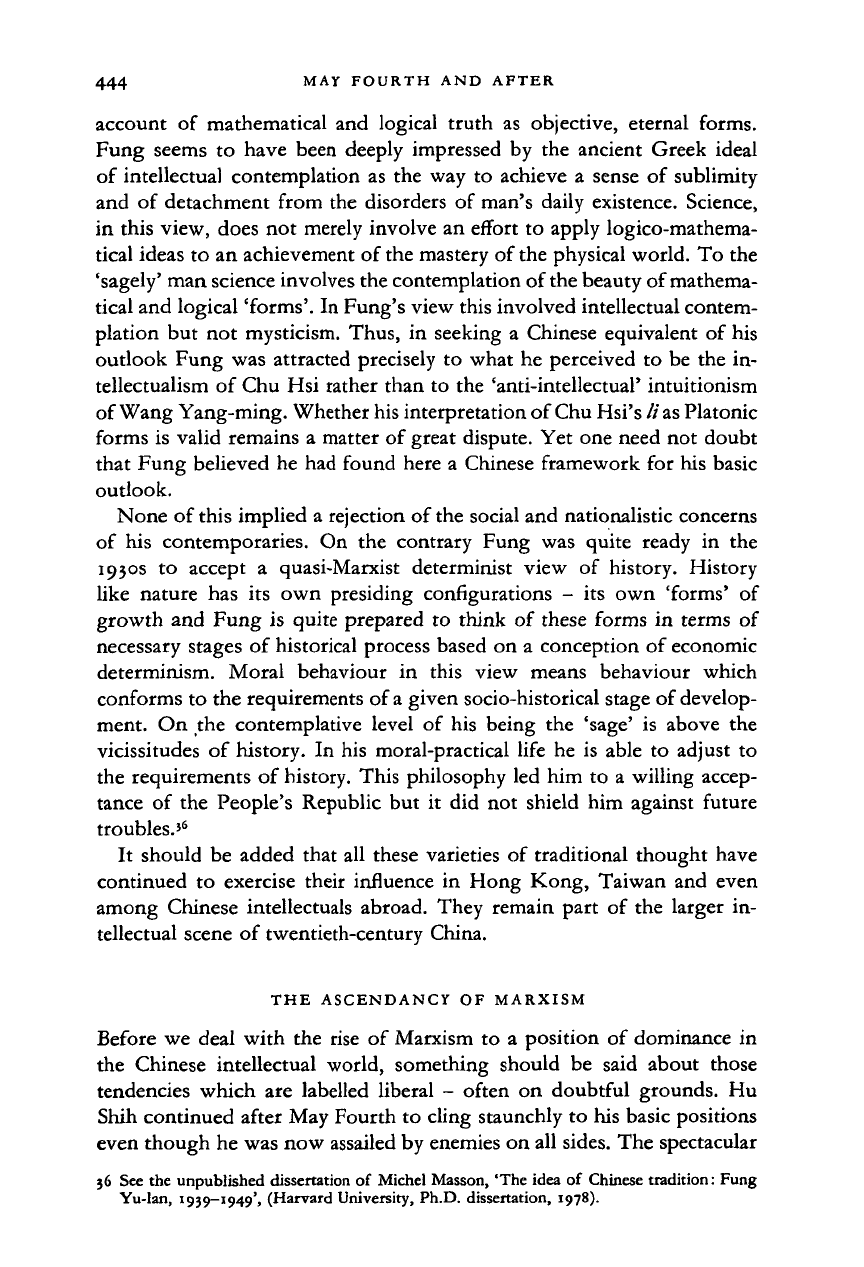
444
MA
* FOURTH AND AFTER
account
of
mathematical
and
logical truth
as
objective, eternal forms.
Fung seems
to
have been deeply impressed
by the
ancient Greek ideal
of intellectual contemplation
as the way to
achieve
a
sense
of
sublimity
and
of
detachment from
the
disorders
of
man's daily existence. Science,
in this view, does
not
merely involve
an
effort
to
apply logico-mathema-
tical ideas
to an
achievement
of
the mastery
of
the physical world.
To the
'sagely' man science involves the contemplation
of
the beauty
of
mathema-
tical and logical 'forms'.
In
Fung's view this involved intellectual contem-
plation
but not
mysticism. Thus,
in
seeking
a
Chinese equivalent
of
his
outlook Fung
was
attracted precisely
to
what
he
perceived
to be the in-
tellectualism
of
Chu
Hsi
rather than
to the
'anti-intellectual' intuitionism
of Wang Yang-ming. Whether his interpretation
of
Chu Hsi's //
as
Platonic
forms
is
valid remains
a
matter
of
great dispute.
Yet one
need
not
doubt
that Fung believed
he had
found here
a
Chinese framework
for his
basic
outlook.
None
of
this implied
a
rejection
of
the social and nationalistic concerns
of
his
contemporaries.
On the
contrary Fung
was
quite ready
in the
1930s
to
accept
a
quasi-Marxist determinist view
of
history. History
like nature
has its own
presiding configurations
- its own
'forms'
of
growth
and
Fung
is
quite prepared
to
think
of
these forms
in
terms
of
necessary stages
of
historical process based
on a
conception
of
economic
determinism. Moral behaviour
in
this view means behaviour which
conforms
to the
requirements
of
a
given socio-historical stage
of
develop-
ment.
On the
contemplative level
of his
being
the
'sage'
is
above
the
vicissitudes
of
history.
In his
moral-practical life
he is
able
to
adjust
to
the requirements
of
history. This philosophy
led him to a
willing accep-
tance
of the
People's Republic
but it did not
shield
him
against future
troubles.'
6
It should
be
added that
all
these varieties
of
traditional thought have
continued
to
exercise their influence
in
Hong Kong, Taiwan
and
even
among Chinese intellectuals abroad. They remain part
of the
larger
in-
tellectual scene
of
twentieth-century China.
THE ASCENDANCY OF MARXISM
Before
we
deal with
the
rise
of
Marxism
to a
position
of
dominance
in
the Chinese intellectual world, something should
be
said about those
tendencies which
are
labelled liberal
-
often
on
doubtful grounds.
Hu
Shih continued after May Fourth
to
cling staunchly
to his
basic positions
even though
he
was now assailed by enemies
on
all sides. The spectacular
36
See the
unpublished dissertation
of
Michel Masson,
'The
idea
of
Chinese tradition: Fung
Yu-lan, 1939—1949', (Harvard University, Ph.D. dissertation, 1978).
Cambridge Histories Online © Cambridge University Press, 2008
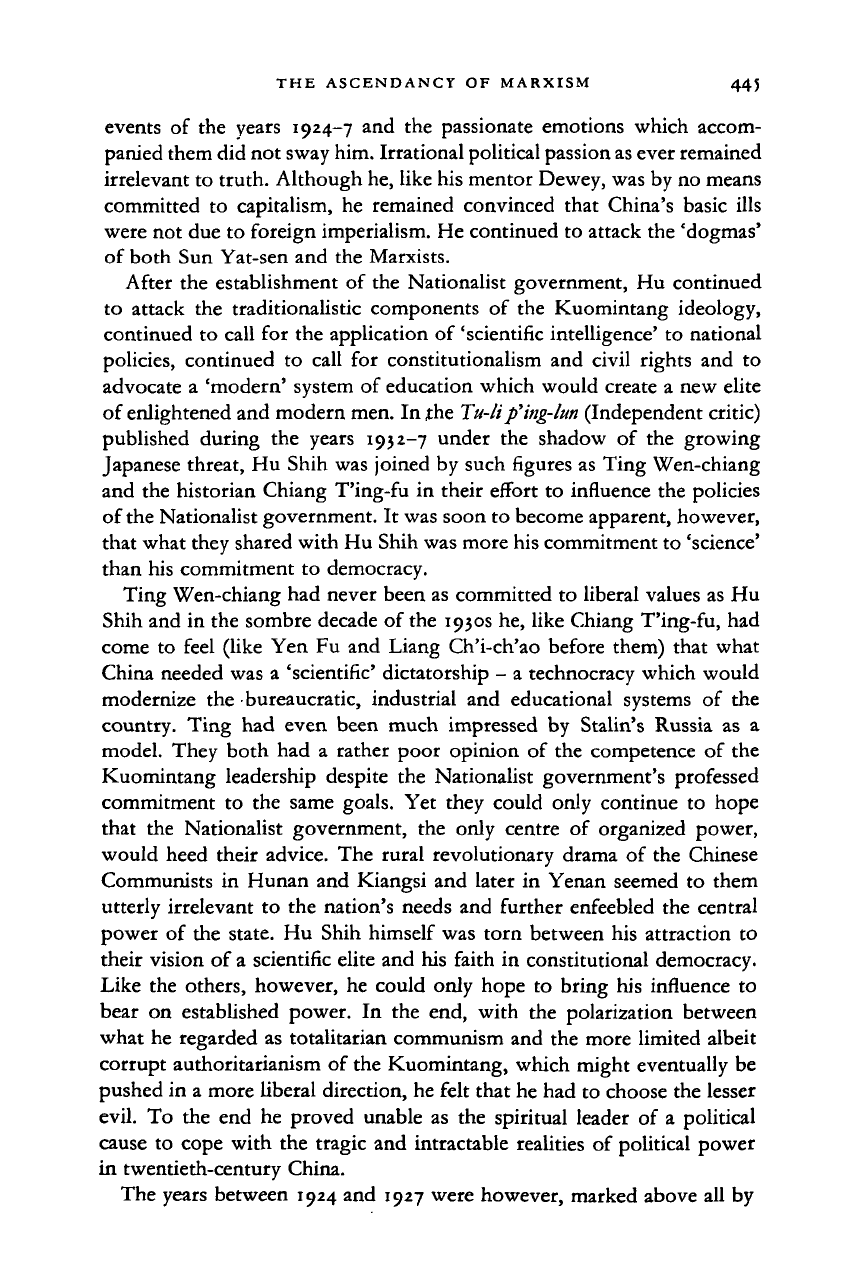
THE ASCENDANCY OF MARXISM 445
events of the years 1924-7 and the passionate emotions which accom-
panied them did not sway him. Irrational political passion as ever remained
irrelevant to truth. Although he, like his mentor Dewey, was by no means
committed to capitalism, he remained convinced that China's basic ills
were not due to foreign imperialism. He continued to attack the 'dogmas'
of both Sun Yat-sen and the Marxists.
After the establishment of the Nationalist government, Hu continued
to attack the traditionalistic components of the Kuomintang ideology,
continued to call for the application of 'scientific intelligence' to national
policies, continued to call for constitutionalism and civil rights and to
advocate a 'modern' system of education which would create a new elite
of enlightened and modern men. In the Tu-li
p'ing-lun
(Independent critic)
published during the years 1932-7 under the shadow of the growing
Japanese threat, Hu Shih was joined by such figures as Ting Wen-chiang
and the historian Chiang T'ing-fu in their effort to influence the policies
of the Nationalist government. It was soon to become apparent, however,
that what they shared with Hu Shih was more his commitment to 'science'
than his commitment to democracy.
Ting Wen-chiang had never been as committed to liberal values as Hu
Shih and in the sombre decade of the 1930s he, like Chiang T'ing-fu, had
come to feel (like Yen Fu and Liang Ch'i-ch'ao before them) that what
China needed was a 'scientific' dictatorship - a technocracy which would
modernize the bureaucratic, industrial and educational systems of the
country. Ting had even been much impressed by Stalin's Russia as a
model. They both had a rather poor opinion of the competence of the
Kuomintang leadership despite the Nationalist government's professed
commitment to the same goals. Yet they could only continue to hope
that the Nationalist government, the only centre of organized power,
would heed their advice. The rural revolutionary drama of the Chinese
Communists in Hunan and Kiangsi and later in Yenan seemed to them
utterly irrelevant to the nation's needs and further enfeebled the central
power of the state. Hu Shih himself was torn between his attraction to
their vision of a scientific elite and his faith in constitutional democracy.
Like the others, however, he could only hope to bring his influence to
bear on established power. In the end, with the polarization between
what he regarded as totalitarian communism and the more limited albeit
corrupt authoritarianism of the Kuomintang, which might eventually be
pushed in a more liberal direction, he felt that he had to choose the lesser
evil. To the end he proved unable as the spiritual leader of a political
cause to cope with the tragic and intractable realities of political power
in twentieth-century China.
The years between 1924 and 1927 were however, marked above all by
Cambridge Histories Online © Cambridge University Press, 2008
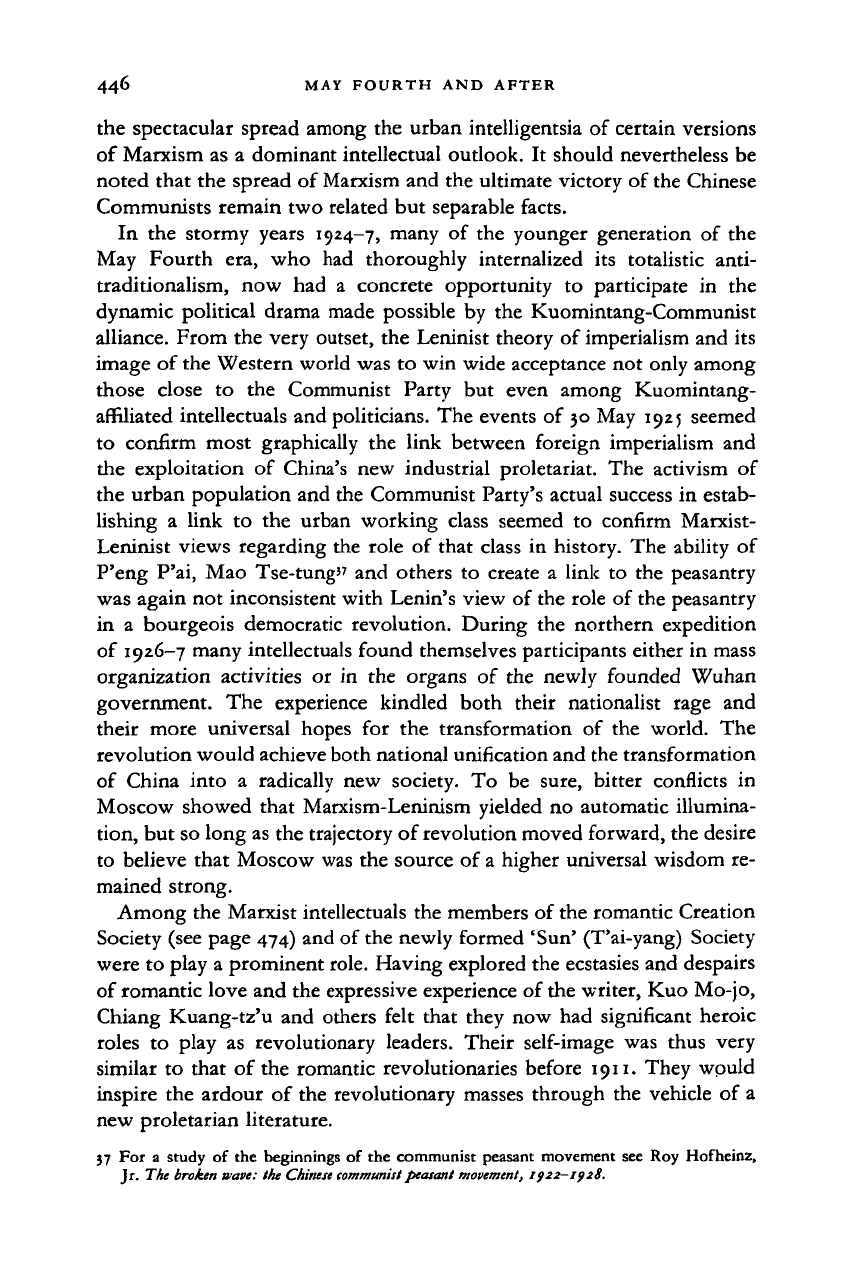
446 MAY FOURTH AND AFTER
the spectacular spread among
the
urban intelligentsia
of
certain versions
of Marxism
as a
dominant intellectual outlook.
It
should nevertheless
be
noted that
the
spread
of
Marxism
and the
ultimate victory
of
the Chinese
Communists remain two related
but
separable facts.
In
the
stormy years 1924-7, many
of the
younger generation
of the
May Fourth
era, who had
thoroughly internalized
its
totalistic anti-
traditionalism,
now had a
concrete opportunity
to
participate
in the
dynamic political drama made possible
by the
Kuomintang-Communist
alliance. From
the
very outset,
the
Leninist theory
of
imperialism
and its
image
of
the Western world was
to
win wide acceptance
not
only among
those close
to the
Communist Party
but
even among Kuomintang-
affiliated intellectuals and politicians.
The
events
of
30 May 1925 seemed
to confirm most graphically
the
link between foreign imperialism
and
the exploitation
of
China's
new
industrial proletariat.
The
activism
of
the urban population
and
the Communist Party's actual success
in
estab-
lishing
a
link
to the
urban working class seemed
to
confirm Marxist-
Leninist views regarding
the
role
of
that class
in
history.
The
ability
of
P'eng
P'ai, Mao
Tse-tung"
and
others
to
create
a
link
to the
peasantry
was again
not
inconsistent with Lenin's view
of
the role
of
the peasantry
in
a
bourgeois democratic revolution. During
the
northern expedition
of 1926-7 many intellectuals found themselves participants either
in
mass
organization activities
or in the
organs
of the
newly founded Wuhan
government.
The
experience kindled both their nationalist rage
and
their more universal hopes
for the
transformation
of the
world.
The
revolution would achieve both national unification and the transformation
of China into
a
radically
new
society.
To be
sure, bitter conflicts
in
Moscow showed that Marxism-Leninism yielded
no
automatic illumina-
tion,
but
so long as the trajectory
of
revolution moved forward, the desire
to believe that Moscow was
the
source
of
a higher universal wisdom
re-
mained strong.
Among
the
Marxist intellectuals
the
members
of
the romantic Creation
Society (see page 474) and
of
the newly formed 'Sun' (T'ai-yang) Society
were
to
play
a
prominent role. Having explored the ecstasies and despairs
of romantic love and the expressive experience
of
the writer, Kuo Mo-jo,
Chiang Kuang-tz'u
and
others felt that they
now had
significant heroic
roles
to
play
as
revolutionary leaders. Their self-image
was
thus very
similar
to
that
of
the romantic revolutionaries before 1911. They would
inspire
the
ardour
of
the revolutionary masses through
the
vehicle
of a
new proletarian literature.
J7
For a
study
of the
beginnings
of the
communist peasant movement
see Roy
Hofheinz,
Jr.
The
broken wave:
the
Chinese communist peasant movement, 1922-1928.
Cambridge Histories Online © Cambridge University Press, 2008
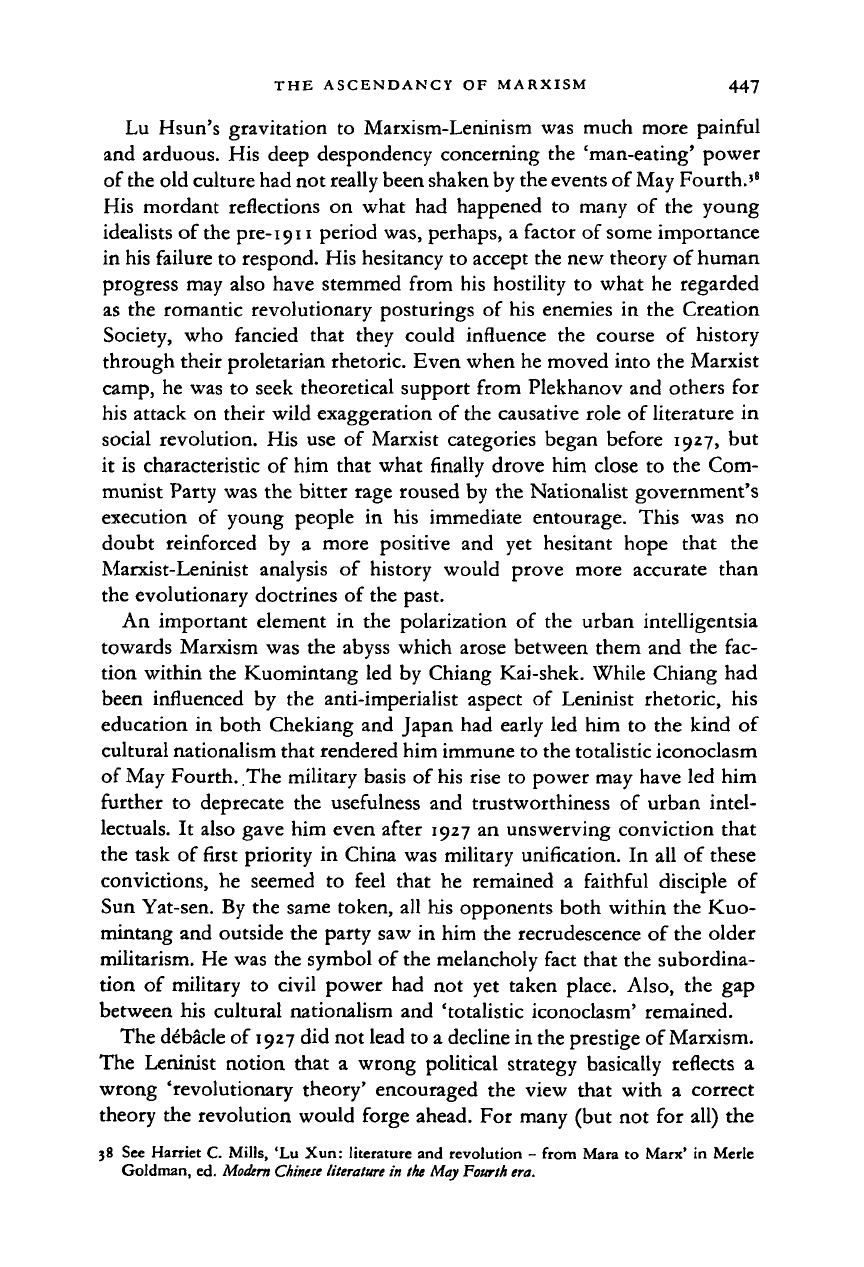
THE ASCENDANCY OF MARXISM 447
Lu Hsun's gravitation to Marxism-Leninism was much more painful
and arduous. His deep despondency concerning the 'man-eating' power
of the old culture had not really been shaken by the events of May Fourth.'
8
His mordant reflections on what had happened to many of the young
idealists of the pre-1911 period was, perhaps, a factor of some importance
in his failure to respond. His hesitancy to accept the new theory of human
progress may also have stemmed from his hostility to what he regarded
as the romantic revolutionary posturings of his enemies in the Creation
Society, who fancied that they could influence the course of history
through their proletarian rhetoric. Even when he moved into the Marxist
camp,
he was to seek theoretical support from Plekhanov and others for
his attack on their wild exaggeration of the causative role of literature in
social revolution. His use of Marxist categories began before 1927, but
it is characteristic of him that what finally drove him close to the Com-
munist Party was the bitter rage roused by the Nationalist government's
execution of young people in his immediate entourage. This was no
doubt reinforced by a more positive and yet hesitant hope that the
Marxist-Leninist analysis of history would prove more accurate than
the evolutionary doctrines of the past.
An important element in the polarization of the urban intelligentsia
towards Marxism was the abyss which arose between them and the fac-
tion within the Kuomintang led by Chiang Kai-shek. While Chiang had
been influenced by the anti-imperialist aspect of Leninist rhetoric, his
education in both Chekiang and Japan had early led him to the kind of
cultural nationalism that rendered him immune to the totalistic iconoclasm
of May Fourth. The military basis of his rise to power may have led him
further to deprecate the usefulness and trustworthiness of urban intel-
lectuals. It also gave him even after 1927 an unswerving conviction that
the task of first priority in China was military unification. In all of these
convictions, he seemed to feel that he remained a faithful disciple of
Sun Yat-sen. By the same token, all his opponents both within the Kuo-
mintang and outside the party saw in him the recrudescence of the older
militarism. He was the symbol of the melancholy fact that the subordina-
tion of military to civil power had not yet taken place. Also, the gap
between his cultural nationalism and 'totalistic iconoclasm' remained.
The debacle of 1927 did not lead to a decline in the prestige of Marxism.
The Leninist notion that a wrong political strategy basically reflects a
wrong 'revolutionary theory' encouraged the view that with a correct
theory the revolution would forge ahead. For many (but not for all) the
38 See Harriet C. Mills, 'Lu Xun: literature and revolution - from Mara to Marx* in Merle
Goldman, ed.
Modern Chinese literature
in the May
Fourth
era.
Cambridge Histories Online © Cambridge University Press, 2008
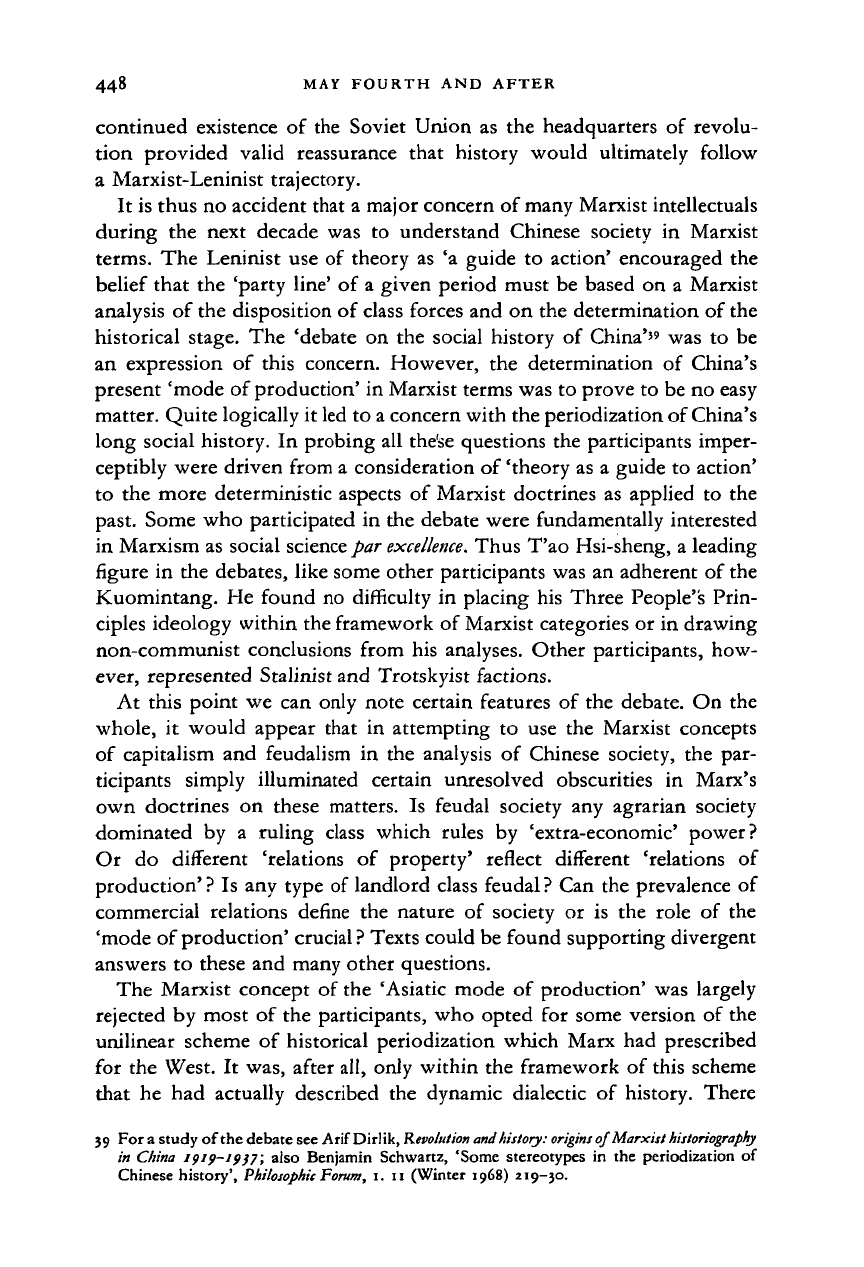
448 MAY FOURTH AND AFTER
continued existence of the Soviet Union as the headquarters of revolu-
tion provided valid reassurance that history would ultimately follow
a Marxist-Leninist trajectory.
It is thus no accident that a major concern of many Marxist intellectuals
during the next decade was to understand Chinese society in Marxist
terms.
The Leninist use of theory as 'a guide to action' encouraged the
belief that the 'party line' of a given period must be based on a Marxist
analysis of the disposition of class forces and on the determination of the
historical stage. The 'debate on the social history of China'" was to be
an expression of this concern. However, the determination of China's
present 'mode of production' in Marxist terms was to prove to be no easy
matter. Quite logically it led to a concern with the periodization of China's
long social history. In probing all the'se questions the participants imper-
ceptibly were driven from a consideration of 'theory as a guide to action'
to the more deterministic aspects of Marxist doctrines as applied to the
past. Some who participated in the debate were fundamentally interested
in Marxism as social science par
excellence.
Thus T'ao Hsi-sheng, a leading
figure in the debates, like some other participants was an adherent of the
Kuomintang. He found no difficulty in placing his Three People's Prin-
ciples ideology within the framework of Marxist categories or in drawing
non-communist conclusions from his analyses. Other participants, how-
ever, represented Stalinist and Trotskyist factions.
At this point we can only note certain features of the debate. On the
whole, it would appear that in attempting to use the Marxist concepts
of capitalism and feudalism in the analysis of Chinese society, the par-
ticipants simply illuminated certain unresolved obscurities in Marx's
own doctrines on these matters. Is feudal society any agrarian society
dominated by a ruling class which rules by 'extra-economic' power?
Or do different 'relations of property' reflect different 'relations of
production'
?
Is any type of landlord class feudal
?
Can the prevalence of
commercial relations define the nature of society or is the role of the
'mode of production' crucial
?
Texts could be found supporting divergent
answers to these and many other questions.
The Marxist concept of the 'Asiatic mode of production' was largely
rejected by most of the participants, who opted for some version of the
unilinear scheme of historical periodization which Marx had prescribed
for the West. It was, after all, only within the framework of this scheme
that he had actually described the dynamic dialectic of history. There
39 For a study of the debate see Arif Dirlik,
Revolution
and history:
origins
of Marxist
historiography
in
China
ifiy-if)?; also Benjamin Schwartz, 'Some stereotypes in the periodization of
Chinese history',
Philosophic
Forum,
i. n (Winter 1968) 219-30.
Cambridge Histories Online © Cambridge University Press, 2008
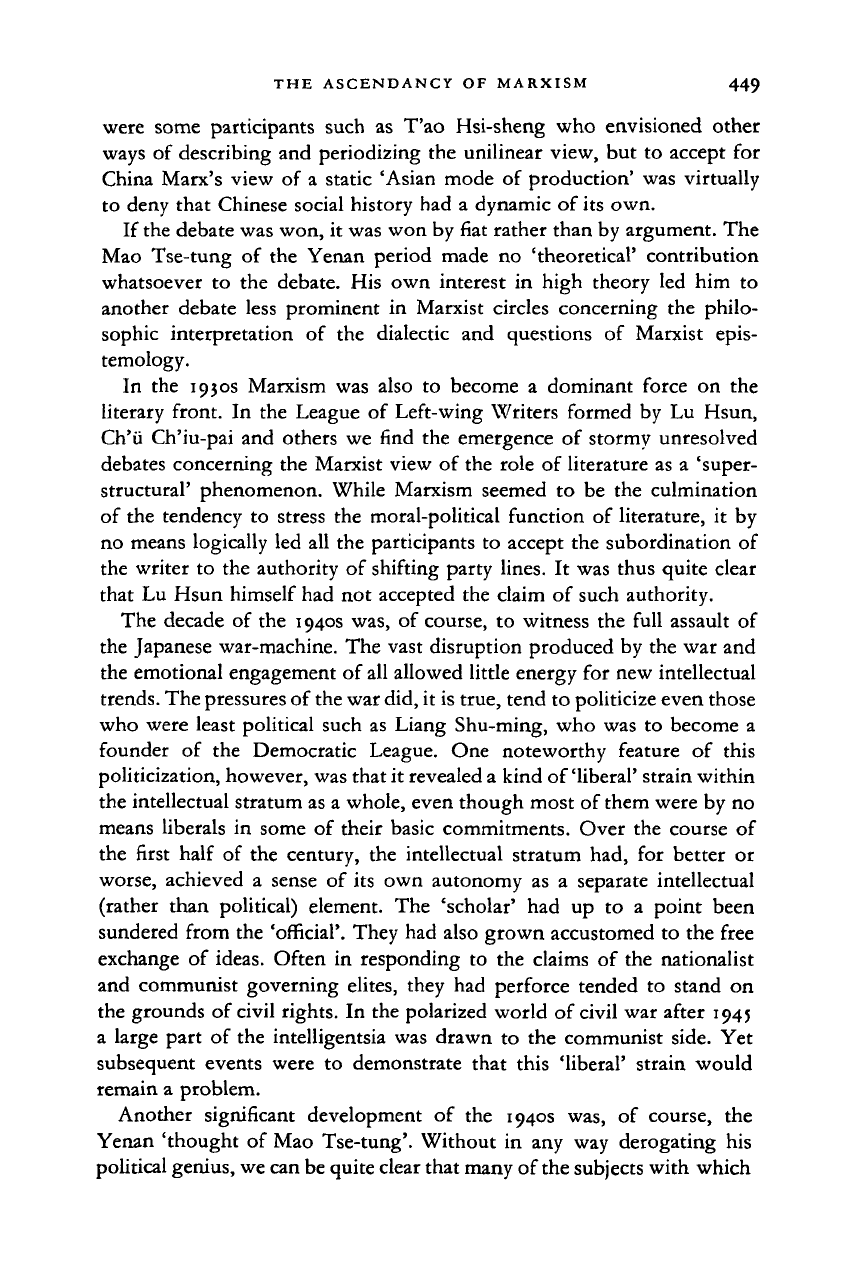
THE ASCENDANCY OF MARXISM 449
were some participants such as T'ao Hsi-sheng who envisioned other
ways of describing and periodizing the unilinear view, but to accept for
China Marx's view of a static 'Asian mode of production' was virtually
to deny that Chinese social history had a dynamic of its own.
If the debate was won, it was won by fiat rather than by argument. The
Mao Tse-tung of the Yenan period made no 'theoretical' contribution
whatsoever to the debate. His own interest in high theory led him to
another debate less prominent in Marxist circles concerning the philo-
sophic interpretation of the dialectic and questions of Marxist epis-
temology.
In the 1930s Marxism was also to become a dominant force on the
literary front. In the League of Left-wing Writers formed by Lu Hsun,
Ch'ii Ch'iu-pai and others we find the emergence of stormy unresolved
debates concerning the Marxist view of the role of literature as a 'super-
structural' phenomenon. While Marxism seemed to be the culmination
of the tendency to stress the moral-political function of literature, it by
no means logically led all the participants to accept the subordination of
the writer to the authority of shifting party lines. It was thus quite clear
that Lu Hsun himself had not accepted the claim of such authority.
The decade of the 1940s was, of course, to witness the full assault of
the Japanese war-machine. The vast disruption produced by the war and
the emotional engagement of all allowed little energy for new intellectual
trends. The pressures of the war did, it is true, tend to politicize even those
who were least political such as Liang Shu-ming, who was to become a
founder of the Democratic League. One noteworthy feature of this
politicization, however, was that it revealed a kind of 'liberal' strain within
the intellectual stratum as a whole, even though most of them were by no
means liberals in some of their basic commitments. Over the course of
the first half of the century, the intellectual stratum had, for better or
worse, achieved a sense of its own autonomy as a separate intellectual
(rather than political) element. The 'scholar' had up to a point been
sundered from the 'official'. They had also grown accustomed to the free
exchange of ideas. Often in responding to the claims of the nationalist
and communist governing elites, they had perforce tended to stand on
the grounds of civil rights. In the polarized world of civil war after 1945
a large part of the intelligentsia was drawn to the communist side. Yet
subsequent events were to demonstrate that this 'liberal' strain would
remain a problem.
Another significant development of the 1940s was, of course, the
Yenan 'thought of Mao Tse-tung'. Without in any way derogating his
political genius, we can be quite clear that many of the subjects with which
Cambridge Histories Online © Cambridge University Press, 2008
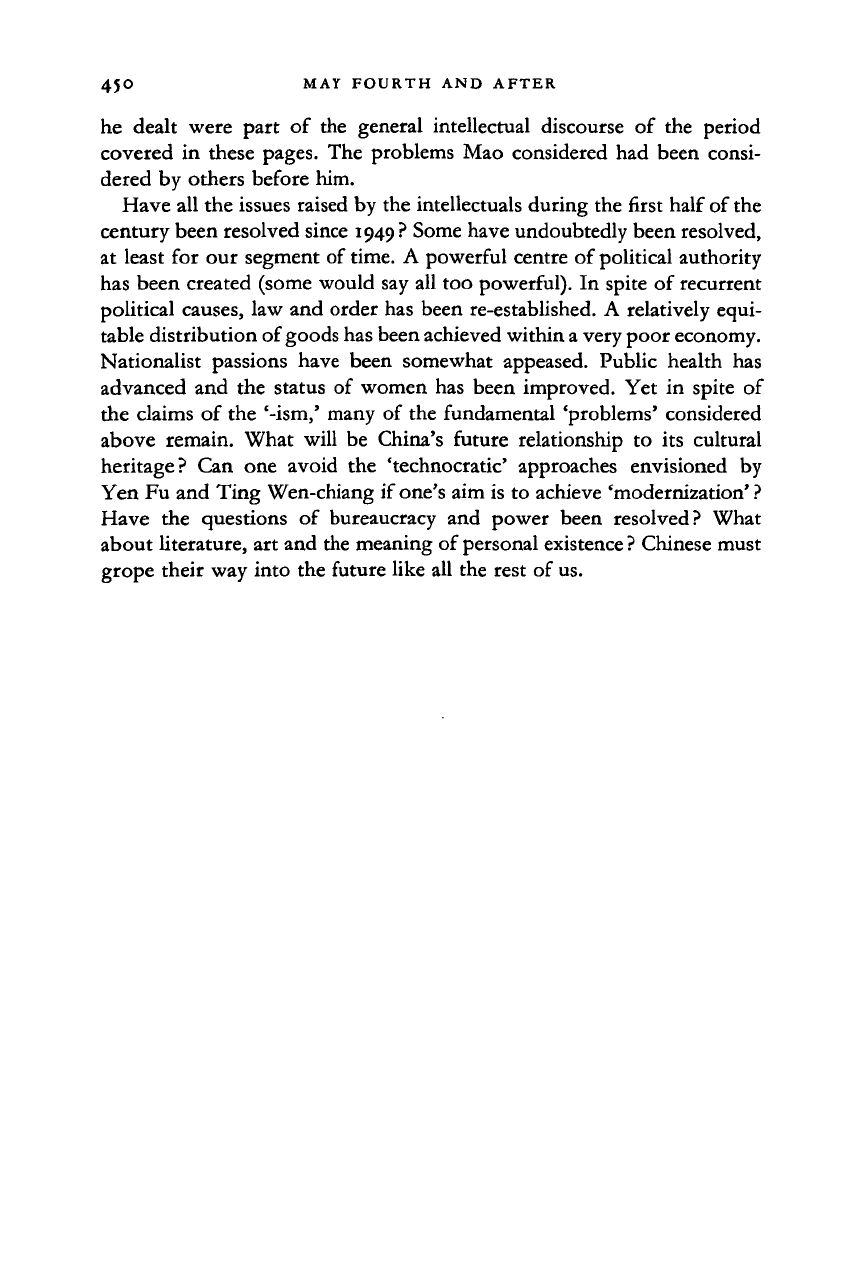
45O MAY FOURTH AND AFTER
he dealt were part of the general intellectual discourse of the period
covered in these pages. The problems Mao considered had been consi-
dered by others before him.
Have all the issues raised by the intellectuals during the first half of the
century been resolved since 1949
?
Some have undoubtedly been resolved,
at least for our segment of time. A powerful centre of political authority
has been created (some would say all too powerful). In spite of recurrent
political causes, law and order has been re-established. A relatively equi-
table distribution of goods has been achieved within
a
very poor economy.
Nationalist passions have been somewhat appeased. Public health has
advanced and the status of women has been improved. Yet in spite of
the claims of the '-ism,' many of the fundamental 'problems' considered
above remain. What will be China's future relationship to its cultural
heritage? Can one avoid the 'technocratic' approaches envisioned by
Yen Fu and Ting Wen-chiang if one's aim is to achieve 'modernization'
?
Have the questions of bureaucracy and power been resolved? What
about literature, art and the meaning of personal existence
?
Chinese must
grope their way into the future like all the rest of us.
Cambridge Histories Online © Cambridge University Press, 2008
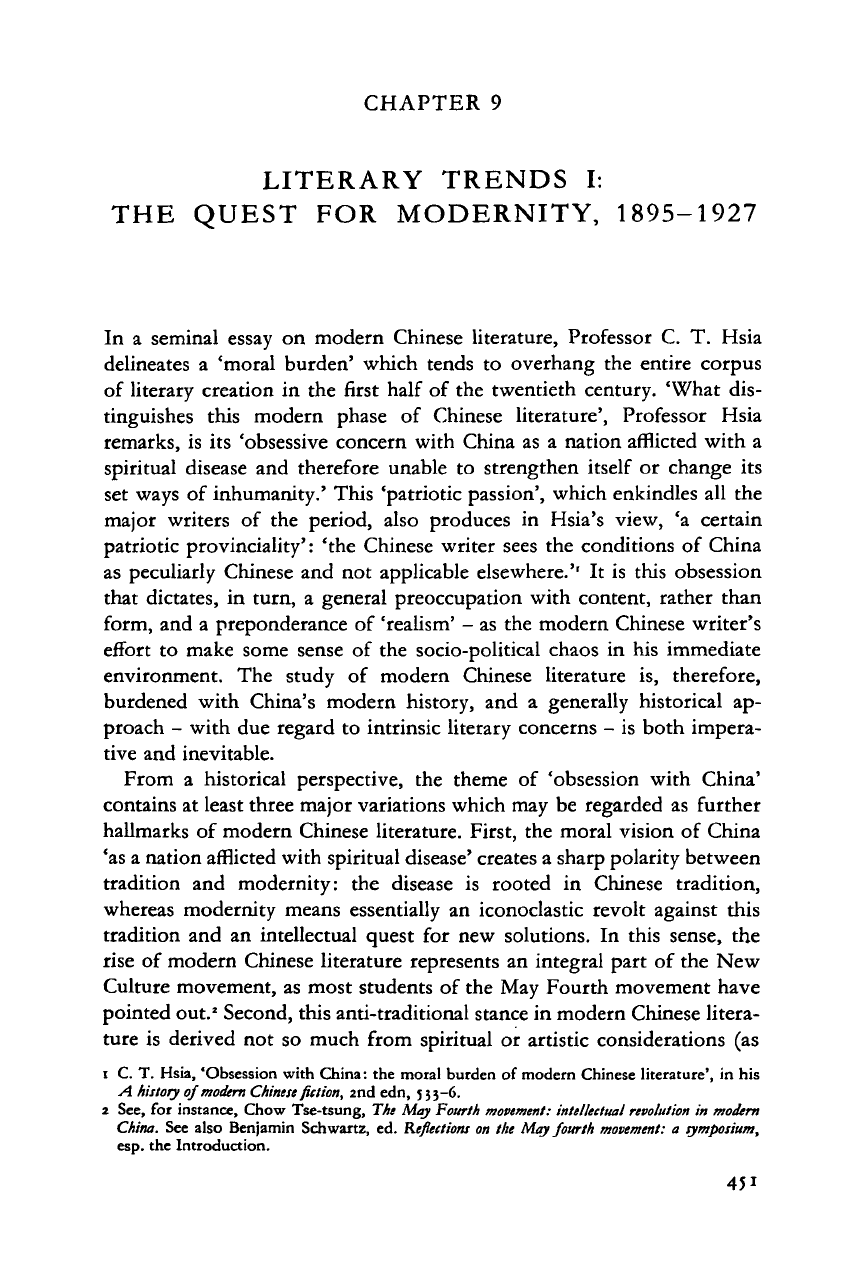
CHAPTER 9
LITERARY TRENDS I:
THE QUEST FOR MODERNITY, 1895-1927
In a seminal essay on modern Chinese literature, Professor C. T. Hsia
delineates a 'moral burden' which tends to overhang the entire corpus
of literary creation in the first half of the twentieth century. 'What dis-
tinguishes this modern phase of Chinese literature', Professor Hsia
remarks, is its 'obsessive concern with China as a nation afflicted with a
spiritual disease and therefore unable to strengthen itself or change its
set ways of inhumanity.' This 'patriotic passion', which enkindles all the
major writers of the period, also produces in Hsia's view, 'a certain
patriotic provinciality': 'the Chinese writer sees the conditions of China
as peculiarly Chinese and not applicable elsewhere.'
1
It is this obsession
that dictates, in turn, a general preoccupation with content, rather than
form, and a preponderance of 'realism' - as the modern Chinese writer's
effort to make some sense of the socio-political chaos in his immediate
environment. The study of modern Chinese literature is, therefore,
burdened with China's modern history, and a generally historical ap-
proach - with due regard to intrinsic literary concerns - is both impera-
tive and inevitable.
From a historical perspective, the theme of 'obsession with China'
contains at least three major variations which may be regarded as further
hallmarks of modern Chinese literature. First, the moral vision of China
'as a nation afflicted with spiritual disease' creates a sharp polarity between
tradition and modernity: the disease is rooted in Chinese tradition,
whereas modernity means essentially an iconoclastic revolt against this
tradition and an intellectual quest for new solutions. In this sense, the
rise of modern Chinese literature represents an integral part of the New
Culture movement, as most students of the May Fourth movement have
pointed out.
2
Second, this anti-traditional stance in modern Chinese litera-
ture is derived not so much from spiritual or artistic considerations (as
1 C. T. Hsia, 'Obsession with China: the moral burden of modern Chinese literature', in his
A
history
of
modern
Chinese fiction, 2nd edn, 553-6.
2 See, for instance, Chow Tse-tsung, The May
Fourth
movement:
intellectual revolution
in
modern
China. See also Benjamin Schwartz, ed.
Reflections on
the May fourth
movement:
a symposium,
esp.
the Introduction.
451
Cambridge Histories Online © Cambridge University Press, 2008
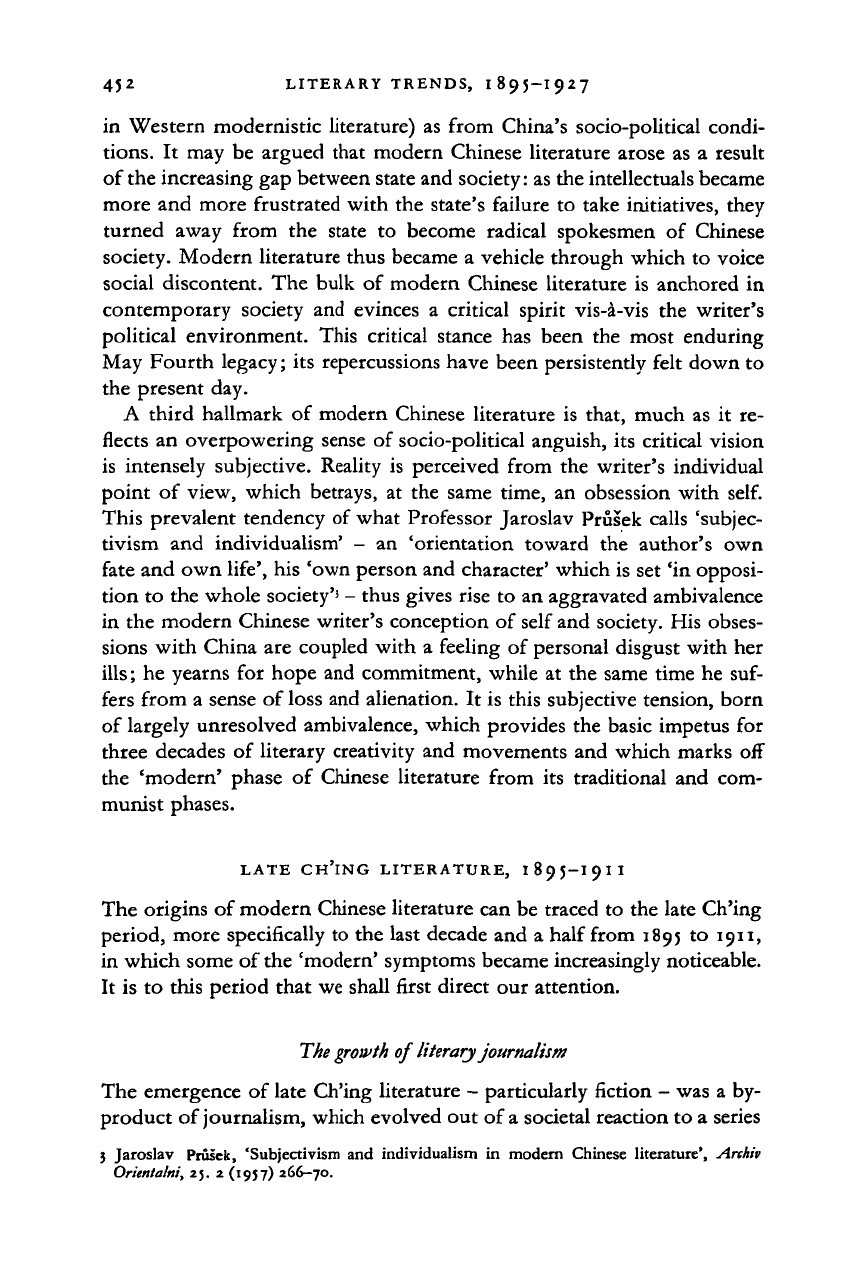
4J2 LITERARY TRENDS, 1895-1927
in Western modernistic literature) as from China's socio-political condi-
tions.
It
may be argued that modern Chinese literature arose as
a
result
of the increasing gap between state and society: as the intellectuals became
more and more frustrated with the state's failure to take initiatives, they
turned away from
the
state
to
become radical spokesmen
of
Chinese
society. Modern literature thus became
a
vehicle through which to voice
social discontent. The bulk
of
modern Chinese literature
is
anchored
in
contemporary society and evinces
a
critical spirit vis-a-vis the writer's
political environment. This critical stance has been the most enduring
May Fourth legacy; its repercussions have been persistently felt down to
the present day.
A third hallmark
of
modern Chinese literature
is
that, much as
it
re-
flects an overpowering sense of socio-political anguish, its critical vision
is intensely subjective. Reality
is
perceived from the writer's individual
point
of
view, which betrays,
at
the same time,
an
obsession with
self.
This prevalent tendency of what Professor Jaroslav Prusek calls 'subjec-
tivism
and
individualism'
- an
'orientation toward
the
author's own
fate and own life', his 'own person and character' which is set 'in opposi-
tion to the whole society'
3
-
thus gives rise to an aggravated ambivalence
in the modern Chinese writer's conception of self and society. His obses-
sions with China are coupled with
a
feeling of personal disgust with her
ills;
he yearns for hope and commitment, while
at
the same time he suf-
fers from
a
sense of loss and alienation.
It
is this subjective tension, born
of largely unresolved ambivalence, which provides the basic impetus for
three decades
of
literary creativity and movements and which marks off
the 'modern' phase
of
Chinese literature from
its
traditional and com-
munist phases.
LATE CH'lNG LITERATURE, 1895-I9II
The origins of modern Chinese literature can be traced to the late Ch'ing
period, more specifically to the last decade and
a
half from 1895
to
1911,
in which some of the 'modern' symptoms became increasingly noticeable.
It is
to
this period that we shall first direct our attention.
The
growth
of literary journalism
The emergence of late Ch'ing literature
-
particularly fiction
-
was
a
by-
product of journalism, which evolved out of a societal reaction to a series
} Jaroslav Prusek, 'Subjectivism and individualism
in
modern Chinese literature', Archiv
Orientalni, 25.
2
(1957) 266—70.
Cambridge Histories Online © Cambridge University Press, 2008
